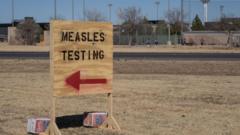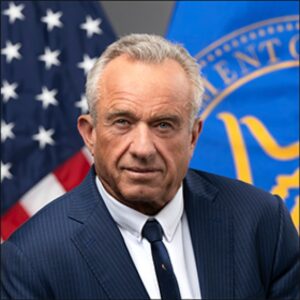A recent report issued by the US Health Department under Secretary Robert F. Kennedy Jr. faces backlash after it was revealed that several cited studies were fabricated. The reports, aimed at addressing the chronic disease crisis among children, have drawn criticism from academics who were misidentified as authors of non-existent research.
US Health Department Report Faces Scrutiny Over Fabricated Research Sources

US Health Department Report Faces Scrutiny Over Fabricated Research Sources
Academics named in a government report on children's health deny authorship of studies cited, claiming they are fictional creations.
A recent health report published by the US government aimed at addressing the chronic disease crisis among children has come under fire for citing "totally fabricated" research studies. Academics wrongly identified as authors of these cited works have called out the inaccuracies, raising significant concerns over the credibility of the findings.
Initially released on May 22, the report delved into the causes of a reported crisis in children's health. However, following an investigation by the digital outlet NOTUS, it was revealed that seven sources referenced within the document were entirely fictitious. An amended version of the report was subsequently issued on May 29 to address these issues, but the White House press secretary, Karoline Leavitt, insisted the core content remained intact, despite acknowledging the presence of "formatting issues."
Leading the department responsible for the contentious report is US Health Secretary Robert F. Kennedy Jr., known for his controversial views on vaccines and their alleged connection to autism. The report was part of a broader initiative stemming from a sweeping executive order signed earlier this year by President Donald Trump, emphasizing the need to investigate the scope of childhood health challenges and the possible contributing factors.
The report attributed rising chronic illnesses among children to a range of issues, including unhealthy diets, environmental toxins, stress, and excessive medical interventions. Yet, the credibility of these findings has been challenged by several academics whose names appeared as authors. Guohua Li, a professor at Columbia University, labeled the citations "totally fabricated," asserting he has no knowledge of the accompanying research. His colleague, Noah Kreski, echoed similar sentiments, stating the research in question appears to be nonexistent.
Katherine Keyes, an epidemiology expert also listed as an author, expressed concern over the importance of accurate citation practices in scientific reporting. Furthermore, it was revealed that another study cited regarding youth-targeted psychotropic medication advertising was incorrectly attributed to an author who similarly did not write it, as confirmed by that individual's university.
The Democratic National Committee publicly criticized Kennedy Jr.'s Department of Health and Human Services for its reliance on unverifiable sources, alleging that the report's citations were riddled with errors, including broken links and misrepresented conclusions. As controversy surrounds this report, Kennedy Jr., who took office as Health Secretary in February, has already made a significant impact on the department, including massive job cuts and plans to implement placebo trials for newly developed vaccines.























